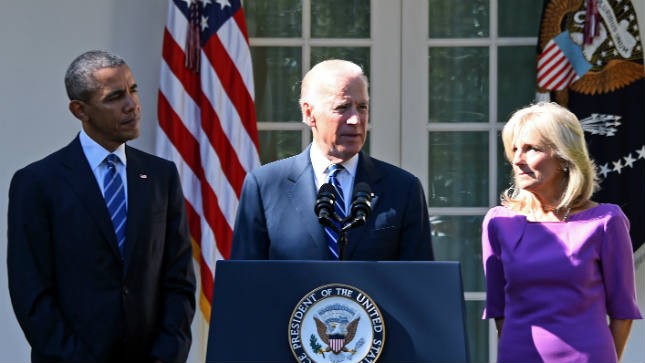OCTOBER 21, 2015
This afternoon in the White House Rose Garden, Vice-President Joe Biden announced that time had run out for him to mount a credible campaign and that he will not become a candidate for President in 2016. Flanked by his wife Jill as well as President Obama, Biden then went on to give a campaign speech that sounded like the one he would give as if he were running, emphasizing the need to protect health care, immigration reform, LGBT rights and, most importantly to him, a cure for cancer, which recently took the life of his eldest son Beau.
Speculation as to whether Biden would say yes has run rampant on the Democratic side since August when New York Times columnist Maureen Dowd wrote that it was Beau Biden’s deathbed wish that his father make a run for the Presidency one more time, arguing that the country needed “Biden values.” Polls that included Biden as a candidate showed that he took away votes from Hillary Clinton but also revealed that Biden would run far behind her in the nomination contest.
Pressure had grown in the last week for Biden to make some kind of decision soon, since Clinton will be testifying tomorrow before the House Special Committee on Benghazi. It was thought that, if Clinton stumbled and then Biden announced a run, he would appear to be an opportunist, thus negating the outpouring of public sympathy Biden has received on the death of his son.
So ends the elective career of one of the most interesting characters in recent American political life. Biden was first elected to the Senate in 1972, a few days before his 30th birthday. One month later, his wife Neilia and one-year-old daughter Naomi were killed in a traffic accident that also injured his sons Beau and Hunter. Biden considered resigning to care for his surviving family, but then-Senate Majority Leader Mike Mansfield talked him out of it and had him sworn into office in a small ceremony in the Delaware hospital. After that, every day Biden made the 90-minute train ride from Wilmington to Washington D.C. and back again to spend evenings with his sons, a laudable practice that give him the nickname of “Amtrak Joe.”
In the 1940s, Presidential adviser Harold Ickes famously said that “The only cure for Presidential fever is embalming fluid,” and Joe Biden definitely had Presidential fever. He flirted with running as early as 1983 and took the plunge in 1987, only to be thwarted by a plagiarism scandal, as he lifted a speech from British pol Neil Kinnock and presented it as his own. The fever never went away for Biden, however, as he considered a run in 2004 and finally said yes in 2007. Running against Sen. Barack Obama, Biden, in an interview, called the African-American candidate “clean and articulate,” a condescending gaffe that ended Biden’s hopes. Obama obviously did not hold it against him and has since become his closest political ally.
In recent days, there was much speculation that Biden might run, particularly yesterday when Biden took two veiled swipes at Hillary Clinton — one, saying that he does not consider Republicans “enemies,” as she did in last week’s debate, and two, emphasizing that when speaking to world leaders, the Secretary of State may meet with them, but when the Vice-President speaks to them, they know that he’s speaking for the President. Take that!
But ultimately it was not to be. In his speech today, Biden emphasized that, while he’s not going to be an active candidate, he’s not going to be silent either, and I suspect that he’s right. He has set himself up as the defender of the Obama legacy, and, as Clinton tries at times to distance herself from the Obama years, Biden will see to it that she does so at her own peril. It should be fascinating to watch.












